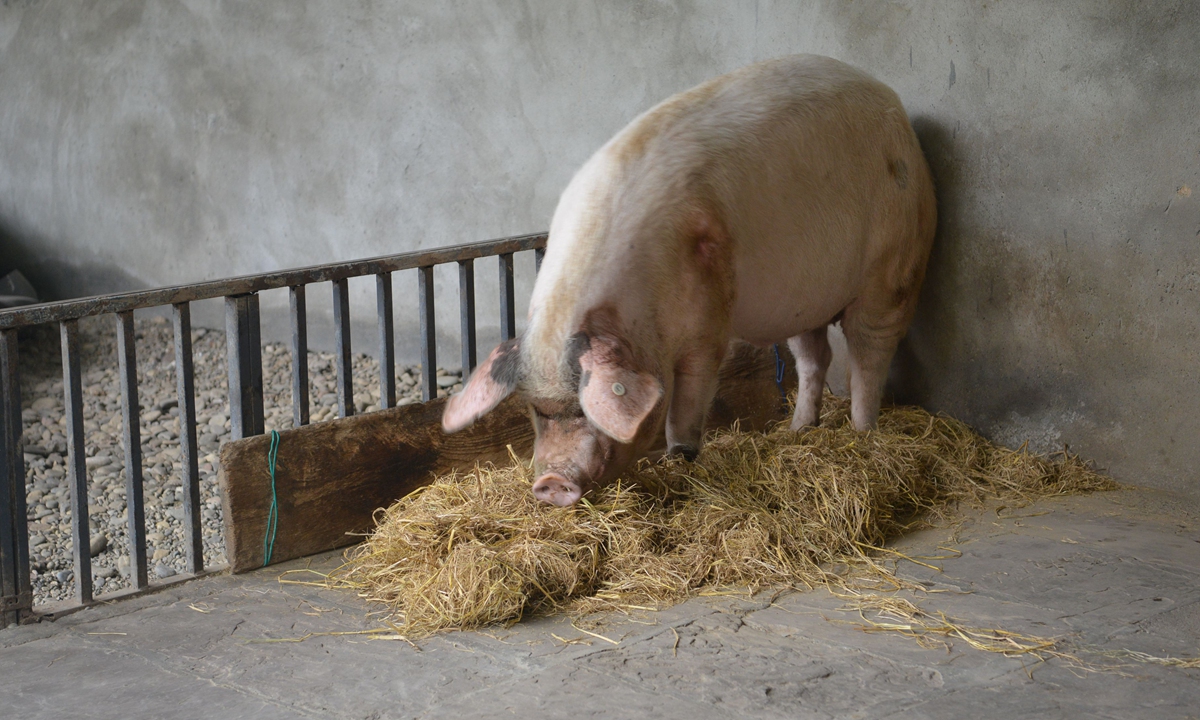Chinese firms confirm halt to some Australian hay imports, seek alternatives
Supplies to be strengthened with more domestic crops

A pig eats hay in Southwest China's Sichuan Province. File photo: cnsphoto
Chinese hay industry representatives confirmed that many Australian suppliers have failed to get permits to export to China, so the sector is looking at alternatives such as more domestic production and other sources of imports.
The Australian Broadcasting Corp reported on Wednesday that Australia's $160-million hay export to China could be the latest casualty in the ongoing trade tensions between the two countries, with 28 Australian businesses that export hay to China having failed to get their expired permits renewed since the end of February.
Industry insiders told the Global Times on Thursday that most of the permits haven't been renewed, with a foreseeable impact on farms that raise cows.
The hay consumption in China is significant - about 1 million tons annually. Of this, domestic producers supply 700,000 tons and 300,000 tons are imported, with Australia being the only source of imports at the moment, industry insiders said.
Exporters who completed loading and handling of export license materials by the end of February can still declare their commodities with customs, but new shipments stopped in March, a manager at a leading Beijing-based hay producer and trader surnamed Wang told the Global Times on Thursday.
There have been no official announcements about the permits, which is a source of uncertainty and risk for the farms, importers and users, said Wang, noting that the impact on ranches may be serious, because there are few short-term alternatives at the moment.
In addition to the 28 companies with expired permits, there are three Australian companies that are still able to export because their expiry date is 2023, according to domestic news site guancha.cn on Wednesday.
A person close to the matter told the Global Times on condition of anonymity that the extension of the permits is under review, which is understandable, given the rising tensions between Beijing and Canberra.
Bilateral relations have been at a freezing point since last year.
Although the absence of Australian hay may cause some disruption to the industry, the impact will be limited and controllable, analysts said.
"There has been a large increase in China's oat-planting area this year, and it is expected that the price of new grass will drop in July and August," a source of the grass industry association of the China Animal Agricultural Association surnamed Gao told the Global Times.
In addition, oats are grasses, which are easy to process, and there's no problem of competition with Australian technology, noted Gao.
China's own hay is enough to meet the current dairy pasture needs, with high-quality hay under cultivation in Gansu Province, the Inner Mongolia Autonomous Region, Hebei Province, and other places, according to the association.
Businesses are also actively responding by increasing the domestic planting area, improving quality and expanding import channels to gradually reduce dependence on Australian imports.
Currently, Wang said, they are applying for imports from Spain, and the government is accelerating the process for approval.
"The problem should be solved completely by next year," predicted Wang, noting that in the long term, Australian hay is not indispensable for the market.


